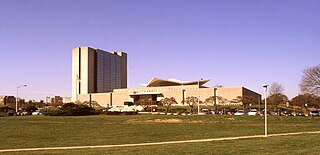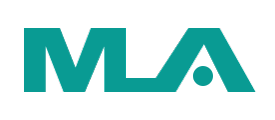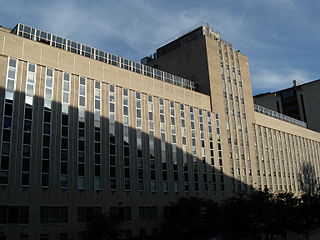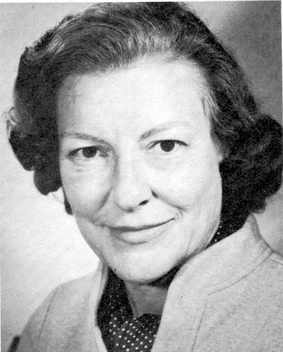MEDLINE is a bibliographic database of life sciences and biomedical information. It includes bibliographic information for articles from academic journals covering medicine, nursing, pharmacy, dentistry, veterinary medicine, and health care. MEDLINE also covers much of the literature in biology and biochemistry, as well as fields such as molecular evolution.

A librarian is a person who works professionally in a library providing access to information, and sometimes social or technical programming, or instruction on information literacy to users.

Health informatics is the study and implementation of computer structures and algorithms to improve communication, understanding, and management of medical information. It can be viewed as branch of engineering and applied science.

The United States National Library of Medicine (NLM), operated by the United States federal government, is the world's largest medical library.
PubMed is a free database including primarily the MEDLINE database of references and abstracts on life sciences and biomedical topics. The United States National Library of Medicine (NLM) at the National Institutes of Health maintains the database as part of the Entrez system of information retrieval.
MedlinePlus is an online information service produced by the United States National Library of Medicine. The service provides curated consumer health information in English and Spanish with select content in additional languages. The site brings together information from the National Library of Medicine (NLM), the National Institutes of Health (NIH), other U.S. government agencies, and health-related organizations. There is also a site optimized for display on mobile devices, in both English and Spanish. In 2015, about 400 million people from around the world used MedlinePlus. The service is funded by the NLM and is free to users.

The Medical Library Association (MLA) is a nonprofit educational organization with more than 3,400 health-sciences information professional members.
An informationist provides research and knowledge management services in the context of clinical care or biomedical research.
PubMed Central (PMC) is a free digital repository that archives open access full-text scholarly articles that have been published in biomedical and life sciences journals. As one of the major research databases developed by the National Center for Biotechnology Information (NCBI), PubMed Central is more than a document repository. Submissions to PMC are indexed and formatted for enhanced metadata, medical ontology, and unique identifiers which enrich the XML structured data for each article. Content within PMC can be linked to other NCBI databases and accessed via Entrez search and retrieval systems, further enhancing the public's ability to discover, read and build upon its biomedical knowledge.

The University of Pittsburgh School of Medicine is a medical school of the University of Pittsburgh, located in Pittsburgh, Pennsylvania. The School of Medicine, also known as Pitt Med, encompasses both a medical program, offering the doctor of medicine, and graduate programs, offering doctor of philosophy and master's degrees in several areas of biomedical science, clinical research, medical education, and medical informatics.
The Master of Library and Information Science (MLIS), also referred to as the Master of Library and Information Studies, is the master's degree that is required for most professional librarian positions in the United States. The MLIS is a relatively recent degree; an older and still common degree designation for librarians to acquire is the Master of Library Science (MLS), or Master of Science in Library Science (MSLS) degree. According to the American Library Association (ALA), "The master’s degree in library and information studies is frequently referred to as the MLS; however, ALA-accredited degrees have various names such as Master of Information Studies, Master of Arts, Master of Librarianship, Master of Library and Information Studies, or Master of Science. The degree name is determined by the program. The [ALA] Committee for Accreditation evaluates programs based on their adherence to the Standards for Accreditation of Master's Programs in Library and Information Studies, not based on the name of the degree."
The Vancouver system, also known as Vancouver reference style or the author–number system, is a citation style that uses numbers within the text that refer to numbered entries in the reference list. It is popular in the physical sciences and is one of two referencing systems normally used in medicine, the other being the author–date, or "Harvard", system. Vancouver style is used by MEDLINE and PubMed.
Index Medicus (IM) is a curated subset of MEDLINE, which is a bibliographic database of life science and biomedical science information, principally scientific journal articles. From 1879 to 2004, Index Medicus was a comprehensive bibliographic index of such articles in the form of a print index or its onscreen equivalent. Medical history experts have said of Index Medicus that it is “America's greatest contribution to medical knowledge.”

A special library is a library that provides specialized information resources on a particular subject, serves a specialized and limited clientele, and delivers specialized services to that clientele. Special libraries include corporate libraries, government libraries, law libraries, medical libraries, museum libraries, news libraries. Special libraries also exist within academic institutions. These libraries are included as special libraries because they are often funded separately from the rest of the university and they serve a targeted group of users.

The University of Central Florida College of Medicine is an academic college of the University of Central Florida located in Orlando, Florida, United States. The VP of Health Affairs and dean of the college is Deborah German.
E-Science librarianship refers to a role for librarians in e-Science.

Donald Allen Bror Lindberg was the Director of the United States National Library of Medicine from 1984 until his retirement in 2015. He was known for his work in medical computing, especially the development of PubMed. He won the 1997 Morris F. Collen Award from the American College of Medical Informatics.

Estelle Brodman (1914–2007) was an American medical librarian and medical historian. She held positions at Columbia University, the National Library of Medicine and the Washington University School of Medicine (WUSM). Brodman served terms as director of the Special Libraries Association, president of the Medical Library Association, and editor of the Bulletin of the Medical Library Association. Under Brodman's leadership, the library at WUSM became known as a leader in the use of computing machines to perform library functions.
Lucretia W. McClure was an American medical librarian. McClure was a director at the Edward G. Miner library, University of Rochester Medical Center. She worked at Boston Medical Library from 1994 to 2011. McClure worked for decades within the Medical Library Association, including serving as President (1990–91). She is the only person to have been interviewed twice for the MLA Oral History Project, first in 1998 and again in 2015.

Miriam Hawkins Libbey was an American medical librarian. She served as the fourth director of the Emory University's A. W. Calhoun Medical Library, now called the Emory University Woodruff Health Sciences Center Library, from 1966 to 1984. In 1984, Libbey was named a fellow of the Medical Library Association for her contributions to the association and the profession of medical librarianship. In 1991, a memorial lecture was named after her by the Georgia Health Sciences Library Association.












